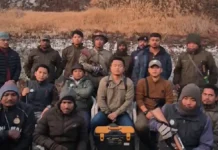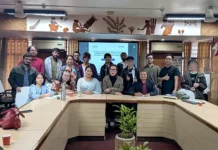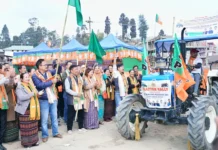RONO HILLS, 21 Feb: The Rajiv Gandhi University (RGU) celebrated International Mother Language Day (IMLD) at the university premises here in Doimukh` on Wednesday.
Speaking at the inaugural function, RGU vice chancellor prof. Saket Kushwaha stressed on the importance of mother language and the need for celebrating such occasions with aplomb in the university to instill in the students “the sense of responsibility to their mother, mother land and the mother language.” He also made reference to both the promise and challenge arising out of fascination for the use of Artificial Intelligence (AI) and its importance in language learning in contemporary times.
RGU registrar Dr. N.T. Rikam began his speech with a salutation in Nyishi, his mother language. Dr. Rikam stressed upon the importance of mother language especially, in the context of Arunachal Pradesh which, he said, is home to various endangered languages.
He also referred to several important works being done in the University with the collaboration of professors, research scholars and students to address the grave challenge that “Arunachal Pradesh is confronted with in terms of preservation of its languages.”
RGU’s head of English department prof. Bhagabat Nayak delivered a short lecture on the term ‘mother language’ and highlighted its recognition in the New Education Policy 2020.
Faculty of languages dean prof. S.S. Singh, head of Hindi department prof. Oken Lego and Hindi assistant professor Dr. Rajeev Ranjan Prasad also spoke.
During the technical sessions, head of Hindi department from Pondicherry University prof. Jaishankar Babu spoke at length on “the role of linguistics and computational linguistics in preservation of indigenous languages.”
Speaking on rich linguistic diversity of the Northeast region, Babu emphasized the need to invest in educational resources such as textbooks and dictionaries in indigenous languages.
Another resource person and head of English department of Veer Narmad South Gujarat University prof. Mahesh Kumar Dey said “Indian multiculturalism/multilingualism make it imperative to work with multilingualism as praxis in the everyday context.” He further said “the uses of the language are integral to the preservation of indigenous languages.”
The programme was organized jointly by the English and Hindi departments under the faculty of languages, RGU.
At Arunachal Pradesh University (APU), Pasighat in East Siang district, the IML Day was celebrated with skit performance, themed “Ngoluke Agom” (our language) by the students of tribal studies department of the University, showcasing the importance of speaking and preserving one’s mother language.
APU registrar Narmi Darang said that even though it is difficult to maintain one’s language in pristine form in this era of globalization and multilingualism, one should strive to preserve their language in the purest form as much as possible.
“Preserving and using one’s mother tongue helps individuals maintain a strong sense of self and connection to their roots,” he added.
APU’s head of tribal studies department Dr. Tarh Ramya said that International Mother Language Day is an opportunity to celebrate and endorse the use of mother tongues.
The Research Institute of World’s Ancient Traditions Cultures and Heritage (RIWATCH) Centre for Mother Languages (RCML), in collaboration with the Kasturba Gandhi Institute of Higher Education (KGIHE), Kebali in Lower Dibang Valley, celebrated the IML Day at the premises of Kasturba Gandhi Institute.
Speaking on the occasion, KGIHE principal Dr. Kailash Chandra Pradhan said that the language played the most crucial role in the inter-generational transmission of cultural heritage. He said, “while learning other languages like Hindi and English, we must also realize the importance of mother tongue and we must speak in our mother language wherever possible.”
RIWATCH executive director Vijay Swami said, “Language and culture are like two inseparable faces of a coin.” He asserted that the rich cultural heritage of Arunachal Pradesh could be revived only by reviving the mother languages.
Earlier, RCML coordinator Dr. Mechek Sampar Awan expressed his concerns about “the gradual language shift taking place in Arunachal Pradesh.” He asserted that speaking one’s mother language is one of the most effective ways to save the language.
An award-winning documentary film titled “The Songs We Sing, The Drums We Beat” was also screened during the programme. Film director and RCML research officer Dr.Kombong Darang said the film aims not only to promote and preserve the culture and language of Kaasik (Nocte) community but also to propagate awareness about the importance of promoting and revitalizing all the endangered and lesser known languages and cultures of the state.
While highlighting the importance of documenting the language and culture of indigenous communities, he said “in order to preserve our cultural heritage, it is important that we speak in the language of our forefathers.”
The film is produced by Centre for Endangered Languages (CFEL), Rajiv Gandhi University (RGU).




